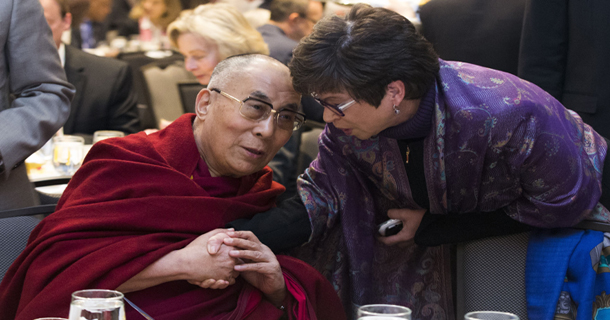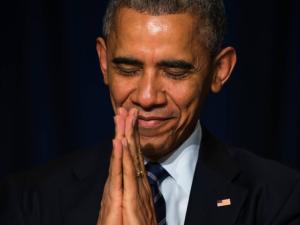
The Dalai Lama waves towards the head table, where US President Barack Obama was seated, during the National Prayer Breakfast
Photo: REUTERS/Kevin Lamarque
His Holiness the Dalai Lama appeared in public alongside United States President Barack Obama at the Annual Prayer Breakfast, a major religious conference held annually in the American capital, Washington DC. China had voiced strong opposition ahead of the meeting, threatening the US with diplomatic consequences should a public meeting occur between His Holiness and Obama, which in turn prompted wide international coverage of the event.
The Prayer Breakfast, which took place on February 5, marked the Dalai Lama and Obama’s first public appearance together: their three previous meetings were held behind closed doors. The annual Prayer Breakfast has long hosted the incumbent US president as guest speaker, alongside local and international religious leaders joining for an hour of solemn prayer.
In the days leading up to the event, White House representative Patrick Ventrell voiced the President’s “strong support [for] the Dalai Lama’s teachings and preserving Tibet’s unique religious, cultural and linguistic traditions
Obama greeted the Dalai Lama in his opening speech as a “good friend and a powerful example of what it means to practice compassion”, praising His Holiness as someone “who inspires us to speak up for the freedom and dignity of all human beings”. Though the leaders did not make direct contact at the conference, a White House representative was seated at His Holiness’ table, signifying his high status at the event.
Chinese officials denounced the meeting in the international press, accusing the president of lending public support to the Tibetan separatist movement. “We are against any country’s interference in China’s domestic affairs under the pretext of Tibet-related issues, and are opposed to any foreign leader’s meeting with the Dalai Lama in any form,” China’s Foreign Ministry spokesman Hong Lei said days before the meeting.
Xinhua, China’s state-run English-language news agency, was also critical of the meeting, warning that “if Obama meets the Dalai Lama,” it might “simply reverse the positive trends [in diplomatic relations] established by China and the US.’
Shi Yinhong, director of the Centre for American Studies at Renmin University in Beijing, speculated on the motive behind the posturing. “If China doesn’t protest, then many other leaders would meet up with the Dalai Lama, and that would have a negative impact on our efforts to bring stability to Tibet,” he explained.

Valerie Jarrett, senior adviser to President Barack Obama talks with the Dalai Lama during the National Prayer Breakfast
Photo: AP/Evan Vucci
Following the Prayer Breakfast, the Dalai Lama met privately with several members of the US Congress, before opening a panel discussion at the US Institute of Peace. His Holiness suggested that the institute might open offices is others countries around the world, expressing optimism that China might one day be ready to host such an organisation. “China is changing” he said, “but it will take some time.





 Print
Print Email
Email